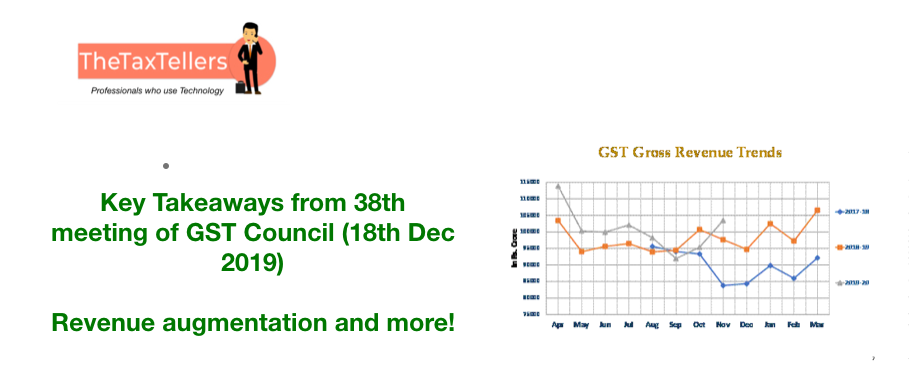38th Meeting of the GST Council was held in New Delhi on 18 December, 2019 wherein various matters with respect to change in rates, expanding the tax base, easing out non-compliances and for the first time departed from its practice of consensus-based decision-making.
The 38th meeting of the GST Council met under the Chairmanship of the Union Minister for Finance & Corporate Affairs Smt. Nirmala Sitharaman here today. The meeting was also attended by the Union Minister of State for Finance & Corporate Affairs Shri Anurag Thakur besides Finance Ministers of States & UTs and senior officers of Ministry of Finance.
Since the inception, the Council departed from its practice of consensus-based decision-making, opting the first time for a vote to settle differences among states over the taxation of lotteries.
(A) Law and Procedure related changes
- Constitution of Grievance Redressal Committees (GRC) at Zonal/State level with both CGST and SGST officers and including representatives of trade and industry and other GST stakeholders like GST practitioners and GSTN etc. to address grievances of specific/ general nature of taxpayers at the Zonal/ State level.
- Extension in Due date for annual return in FORM GSTR-9 and reconciliation statement in FORM GSTR-9C for FY 2017-18 to 31.01.2020.
- Measures to be taken to improve filing of FORM GSTR-1
- Waiver of late fee to be given to all taxpayers in respect of all pending FORM GSTR-1 from July 2017 to November 2019, if the same are filed by 10.01.2020.
- Blocking of E-way Bill for taxpayers who have not filed their FORM GSTR-1 for two tax periods.
- Restriction on availing Input tax credit (ITC) to the recipient in respect of invoices or debit notes that are not reflected in his FORM GSTR-2A shall be restricted to 10% of the eligible credit available in respect of invoices or debit notes reflected.
- Blocking of fraudulently availed input tax credit in certain situations to check the menace of fake invoices.
- Standard Operating Procedure (SOPs) for tax officers to be issued for actions to be taken in cases of non-filing of FORM GSTR 3B returns.
- Due date of filing GST returns for the month of November, 2019 to be extended in respect of a few North Eastern States. Further, for other other states, due date for filing GSTR 3B for November has been extended to 23rd Dec 2019.
The Council also approved various law amendments which will be introduced in Budget 2020.
(B) Discussions On Rate Changes
- Exemption on upfront amount payable for long term lease of industrial/ financial infrastructure plots by an entity wherein 20% or more ownership is held by Central or State Government instead of existing 50% or more ownership of Central or State Government. This change shall become effective from 1st January, 2020. 2.
- Levy of a single rate of GST @ 28% on both State run and State authorised lottery. This change shall become effective from 1st March, 2020.
- Discussion on rate of GST rate on Woven and Non-Woven Bags and sacks of polyethylene or polypropylene strips or the like , whether or not laminated, of a kind used for packing of goods ( HS code 3923/6305) in view of the requests received post the changes recommended on such goods in last meeting and
- Increase in GST rate to a uniform 18%(from 12%) on all such bags falling under HS 3923/6305 including Flexible Intermediate Bulk Containers (FIBC). This change shall become effective from 1st January, 2020.
(C) Discussions on Revenue Augmentation
Presentation was made to the Council on the following issues based on discussions in the Committee of officers of State and Centre on revenue augmentation:
- Revenue,
- GST rate structure and
- Compensation needs of the States.
GST Gross Revenue Trends :
Subsequently, constructive discussions were held after presentation on a wide range of issues such as:
- Measures for encouraging voluntary compliance,
- Expanding tax base,
- Measures to improve return filing and tax collection and rate rationalisation.
- Automation measures such as e-invoice, new return system, QR code on bills were also discussed.
- Further, to exchange knowledge about best practices of tax administration, State of UP and UT of J&K made presentation on their effort to improve GST collection, as in the recent past they have shown a healthy growth in compliance.
GST Council also gave necessary guidance on further analysis regarding exemption and concession impact analysis, tax base analysis, sensitivity analysis and compliance measures needed to keep pace with revenue needs. The Council also directed for expeditious implementation of IT and other initiatives.
Trust the above was useful.
Regards, TheTaxTellers Team


